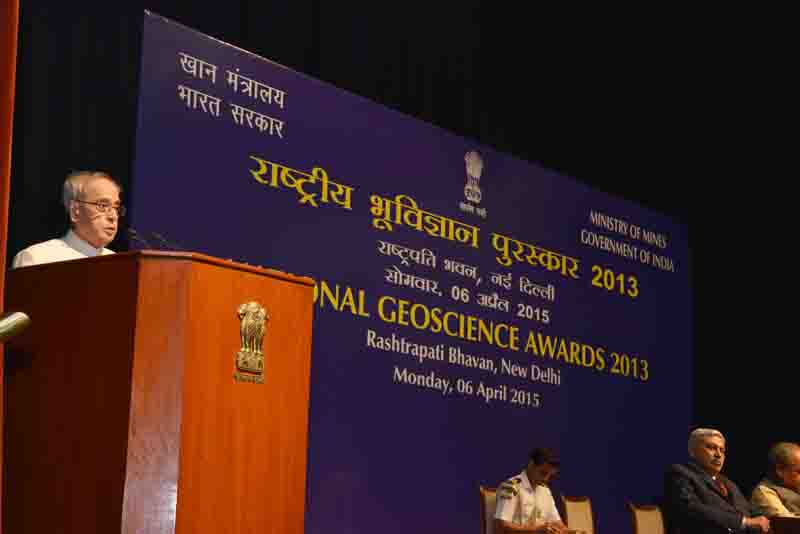Speech by the President of India, Shri Pranab Mukherjee at the Presentation of National Geoscience Awards 2013
Rashtrapati Bhavan, New Delhi : 06.04.2015
 (94.17 KB)
(94.17 KB) 1.I am indeed happy to be amidst you this evening to confer the National Geo-science Awards for the year 2013. At the outset, I would like to take this opportunity to congratulate the recipients of these Awards who have contributed to the growth of geo-sciences in our country through their inspirational and dedicated work.
1.I am indeed happy to be amidst you this evening to confer the National Geo-science Awards for the year 2013. At the outset, I would like to take this opportunity to congratulate the recipients of these Awards who have contributed to the growth of geo-sciences in our country through their inspirational and dedicated work.
2.These Awards were instituted in 1966 as the National Mineral Awards with the objective to honour and recognize individual and teams of scientists for their extraordinary achievements in the field of fundamental or applied geo-sciences, mining and allied areas. Over time, the scope of these Awards was widened to accommodate new and relevant fields of geo-scientific development. In 2009, it was enlarged into the National Geo-science Awards to foster further research in Geo-sciences. I compliment the Ministry of Mines for this initiative. It is heartening to note that these prestigious Awards not only recognize lifetime contributions but also take cognizance of the outstanding efforts of young researchers.
Ladies and Gentlemen:
3.Geo-science is a comprehensive branch of science that deals with the planet Earth. The phenomena that make Earth the most magnificent spectacle of nature are diverse. The study of geo-sciences enables mankind to decipher the interplay of various forces of nature. This important science stream helps us to unravel the mystery of the origin and dynamism of the earth, the oceans, earthquakes, volcanoes, river systems and the like. It also contributes to our growing understanding of the evolution of life on this planet.
4.Geo-science is an old discipline. Since ages, it has defined the trajectory of human civilizations and their transitions. The findings within the domain of this scientific field have shaped the Stone Age, Copper Age, Bronze Age and Iron Age. More recently, it has helped build the foundation of the modern industrial world - be it spaceship or aircraft, cell phone or computer, nuclear devise or missile system. Outcomes that have emerged from geo-scientific research have contributed to scientific progress in no small measure.
Ladies and Gentlemen:
5.India, with a unique geological diversity, has played a significant role in the evolution of geo-sciences. The concepts developed in our country on Gondwanaland, Charnockites, Carbonatites, Tectonics, Earthquakes and ore deposits in the late nineteenth and early twentieth century have been instrumental in the growth of this vast discipline. A noteworthy development in the 1890s’ India has been the introduction of petrological microscope for the study of rocks for the first time ever.
6.India has a rich heritage of geological research work. The Geological Survey of India, established in 1851, is the second oldest amongst such organizations in the world. Over the years, it has developed a huge depository of knowledge in diverse fields of geo-science. It has helped produce a large pool of talented geo-scientists who have left an indelible mark in different realms from the lofty Himalayas to the abyss of the oceans, the scorching deserts, the remote forests and the freezing Arctic. This apex organization has spawned a number of academic organizations, research institutes and exploration agencies. I am pleased to see the tradition of research and development being maintained and further nurtured in the different institutes and organizations in our country.
Ladies and Gentlemen:
7.India’s mineral and mining sector faces an acid test for sustaining the growth potential of our economy. Our mineral endowment poses both a challenge and an opportunity for geo-scientists. The Government is committed to promote research and development in this area. The geo-scientists should evolve an efficient work plan for development, conservation and augmentation of these precious mineral resources. They should put forward innovative ideas to achieve sustainable development of our country and at the same time address societal concerns.
8.The adverse impact of ecological degradation and climate change has emerged as a major concern the world over. No part of the globe is today immune from the menace of environmental disaster. Our nation, too, has bore the brunt of a series of natural calamities in the recent times. They have resulted in a severe loss of life and property. The occurrence of many of these disasters is attributed to human interference with the natural balance. There is, therefore, a need for more objective research by the geo-scientific community in the field of disaster management to mitigate environmental hazards and ensure greater resilience to such adversities.
Ladies and Gentlemen:
9.Our geo-scientific organizations and other institutes have, over the last few decades, invested heavily in analytical and instrumental infrastructure. By making good use of these instruments, our scientists should accomplish significant outcomes to shape geo-science of the future. James Hutton, who lived in the eighteenth century and is considered the father of modern geology, had said and I quote: "In matters of science, curiosity gratified begets not indolence but new desires” (unquote). I am confident that with dedication and enthusiasm, our geo-scientists will beat all odds and come out with flying colours.
10.I once again I take the opportunity to congratulate all the scientists awarded today and hope that they continue with their pursuits to set standards of excellence for others. With these words, I conclude.
Thank you.
Jai Hind.








